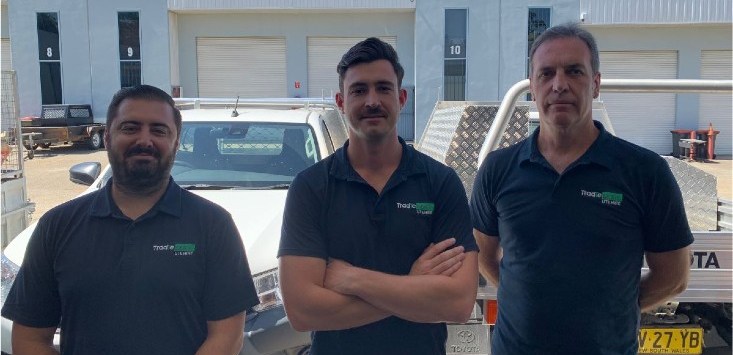
TradieSpec co-founders Richard McDonald, Tim Cullen and Matt Deeks. Source: supplied.
Just a few weeks ago, TradieSpec founder Tim Cullen was heading up a fast-growing business, with three investors primed to pump some funding into it.
Now, as the COVID-19 crisis deepens, he’s made the crushing decision to call off his first capital raise, bracing instead for a difficult few months.
Founded in November 2018, Sydney-based TradieSpec is a platform offering tradespeople rental utes, kitted out to requirement with toolboxes, ladder racks and towbars.
Customers can choose short-term hire, if their own wheels are in need of repair. Or, they can opt for a three- to 12-month lease, for example, if they’re starting up a new business and have struggled to secure credit to purchase their own vehicle.
So far, alongside co-founders Richard McDonald and Matt Deeks, Cullen has been seeing some success.
“We’ve seen unreal growth,” he tells SmartCompany.
“The demand we’ve seen across the board has been great.”
The first-time founders started out with one ute, now they have 44.
The business is turning over about $350,000 in annual revenue, Cullen says.
“As a result of that, we’ve seen some interest from a fair few investors to help us grow the business,” he says.
The plan was to take the business interstate over the next few months — expanding into Brisbane and Melbourne.
The founders have spent the past 12 months meeting with and pitching to potential investors, with the aim of raising $250,000 in seed funding.
“We’ve probably had 75 to 80 meetings,” Cullen says
“The majority, obviously, were no’s.”
Come March, they had three solid, keen investors in the final stages of due diligence.
But, as COVID-19 continued to spread, and the extent of the potential economic effects started to become clear, the team found themselves making the hardest decision of their startup lives.
“I couldn’t look the potential investors in the face and say we’re going to be able to grow this business with your capital,” Cullen explains.
“We basically made the decision from our gut instinct,” he adds.
“This is not the right time.”
A tough call
Cullen admits walking away from the investment wasn’t an easy thing to do. It also wasn’t a decision the team came to quickly.
“It nearly broke us,” he admits.
“It took us so long to find these [investors], and it was such a difficult process.”
He also admits there was a small part of him that wanted to plough ahead with the deal regardless.
Over a period of five days or so, the three co-founders sat down on four separate occasions for a heart to heart and to “kick it around”, Cullen says.
“At first, I said ‘I think we can get through this’,” he recalls.
“Then, it kind of escalated from there.”
The number of infected people continued to increase, and the restrictions on public gatherings kicked in.
The co-founders sat down again, and again. And the mood changed.
“If we’re going to be smart about this, we need to make a tough decision … in the hope that when the economy does kick back in, we can ride that wave of growth with the capital then,” Cullen explains.
“If we took on the capital now, the business would just float along, paying expenses,” he says.
“It would use it up with no real growth.”
“Out of literally nowhere”
Now, the startup is remaining cash-strapped for the foreseeable future, and Cullen and his co-founders are left shellshocked.
“It’s kind of surreal,” Cullen says.
“The decision was a really tough, emotional one to make.
“Everyone in the business has got so much invested in it, and we’ve achieved such good growth over the past 12 to 13 months.
“What has happened? It’s come out of literally nowhere.
“At the start of the year we’re planning to take on the capital, we’re planning to grow the business interstate.
“All of a sudden it’s like, let’s just bunker down and hope we don’t run out of cash over the next six months,” he adds.
To make matters worse, TradieSpec has a handful of employees, many of whom left higher-paying positions for the opportunity of working at a promising startup.
“The promise to them was that we were going to find that capital, build the business as a result of it, and they were going to see the financial outcome,” Cullen says.
“Now, we have to have this tough conversation with them,” he explains.
“It’s still going to be financially tough for all of us.”
Currently, all of the business’ utes are out on hire, so there’s money coming in for the next few weeks, he explains.
After that “it’s the unknown”.
“How long is this going to take? And how long do we have to try and maintain our cash position for, if the money stops coming in?”
Now, Cullen is in the process of creating a contingency plan — one that involves hanging on to as much cash as possible.
The founders are looking into cost-cutting measures — asking for grace periods on the finance for the vehicles, cutting advertising and merchandising, and reducing fuel and toll costs.
“For us, cash is king. And I think that’s probably the same for most small businesses,” Cullen says.
“Across the board really … it’s a weird situation.”
NOW READ: “A knowledge vacuum”: As COVID-19 causes economic chaos, will startup investment dry up?


COMMENTS
SmartCompany is committed to hosting lively discussions. Help us keep the conversation useful, interesting and welcoming. We aim to publish comments quickly in the interest of promoting robust conversation, but we’re a small team and we deploy filters to protect against legal risk. Occasionally your comment may be held up while it is being reviewed, but we’re working as fast as we can to keep the conversation rolling.
The SmartCompany comment section is members-only content. Please subscribe to leave a comment.
The SmartCompany comment section is members-only content. Please login to leave a comment.